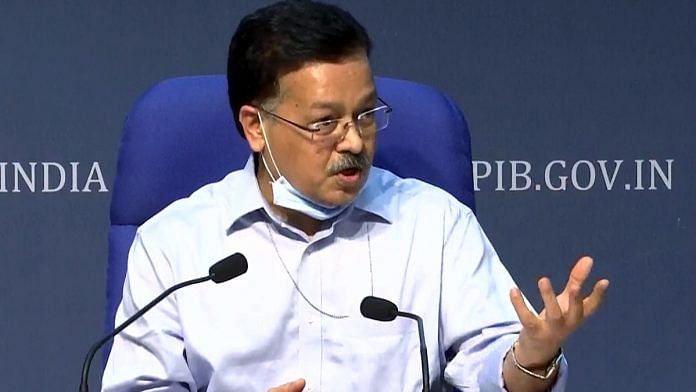New Delhi: Rejecting hopes on herd immunity, the central government Thursday said that unless a Covid-19 vaccine is available, herd immunity for a country with a 138 crore population can only come at a very high and unacceptable human cost.
The remark comes even as the results of the Delhi’s serological survey last week raised hopes of herd immunity.
At a daily briefing, Officer-on-Special Duty (OSD) in the health ministry Rajesh Bhushan said India is in talks with various stakeholders on vaccines, but has not yet signed any agreement with a vaccine manufacturer for supplies.
“Herd immunity is a kind of indirect protection from a disease. It happens only when a population becomes immune either through a vaccine or immunity developed through previous infections,” he added.
“The 2011 Census put the population of the country at 121 crore. Currently by available estimates of WHO and other UN bodies, it stands at 138 crore. In a country with a population of this size, herd immunity is not an option without a vaccine. It can only be an outcome and at a very high human cost. It cannot be a strategic option because it will come at a very high cost,” he added.
“There will be a very high number of cases and deaths — hundreds and thousands, overwhelming hospitals and bringing the healthcare system to its knees. That cannot happen,” Bhushan said.
He added that the Ministry of Health believes that herd immunity is a long way off so measures like social distancing, masking and hand hygiene are of paramount importance.
The results of the Delhi serological survey showed that a quarter of Delhi’s population has developed antibodies to the virus, which means they have been exposed to the virus at some point in the last five months.
Herd immunity is a situation when a critical mass of the population is resistant to a particular virus and, therefore, cannot contract a new infection, thus effectively breaking the chain of transmission. This is most commonly achieved with a vaccine.
For Covid-19, there are many unknowns in the herd immunity path on which the UK had briefly embarked before being forced into a lockdown.
For one, what that critical mass is in terms of percentage of a population is still largely unknown. Moreover, several recent studies have found that Covid-19 antibodies do not last long enough in the blood to provide lasting protection.
Also read: India’s Covid future ultimately depends on the people, state response, says top health officer
On vaccines
On a question about vaccines, Bhushan said that according to a document prepared by the World Health Organization, 24 vaccine candidates are in various stages of human trials while 141 others are in the pre-clinical stages.
“Three vaccines are in phase III trials, one in the US, one by Oxford University and one in China. This is an advanced stage, so they are expected to get regulatory approval soon if the trials succeed. In India, two vaccines are in Phase I and II trials, one in 8 sites on 1,150 subjects and one in 5 sites in 1,000 subjects.”
Bhushan added that whenever a vaccine does develop, India because of its prowess as a vaccine manufacturer is likely to play a key role in manufacturing.
Vaccines can come either through the efforts of multilateral organisations such as WHO and GAVI, and or when individual countries negotiate with successful vaccine manufacturers and sign agreements with them for supply.
“India has not signed any agreements with any vaccine manufacturer so far. However, we are in talks with various stakeholders,” he added.
Tests have increased, positivity a concern
The OSD talked about how India has stepped up Covid testing in recent weeks with the aim to bring down sample positivity rates below 10 per cent and eventually below 5 per cent as is the WHO recommendation.
“We are talking to states with a high positivity and have shared detailed letters with them on how to bring it down,” Bhushan said.
On a question about claims under insurance scheme for healthcare workers, he said that of the 131 claims received so far, 20 have been cleared, 64 have been processed and others are in various stages of clearance.
The maximum number of claims have come from Maharashtra, Delhi and Telangana, he said.
Also read: Coronavirus in India now growing at the fastest rate in the world




brain spinal cord neurons are not replaceable,dr robin murphy nd homeopath expert on neuro degenerative diseases like parkinson alzheimer huntington are outcome after drug toxins viruses stroke ageing etc,so even after we come out of corona crisis it will be in order if homeopathy is adopted as acute illness produce many incipient health problems.